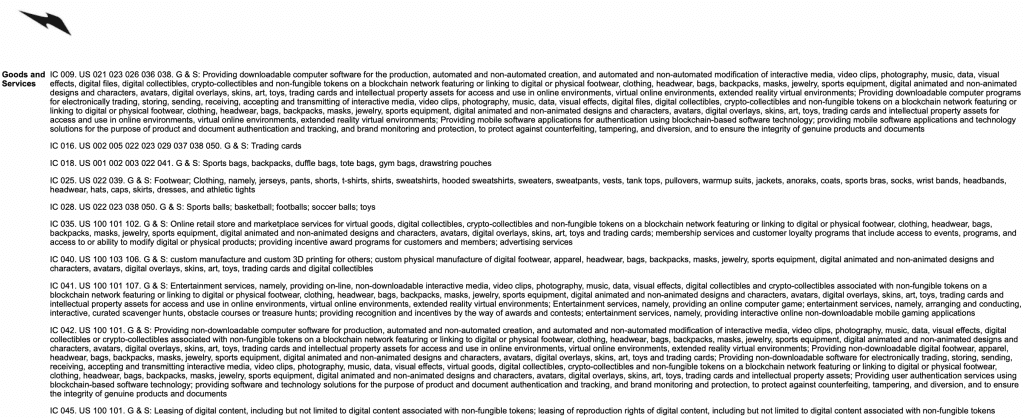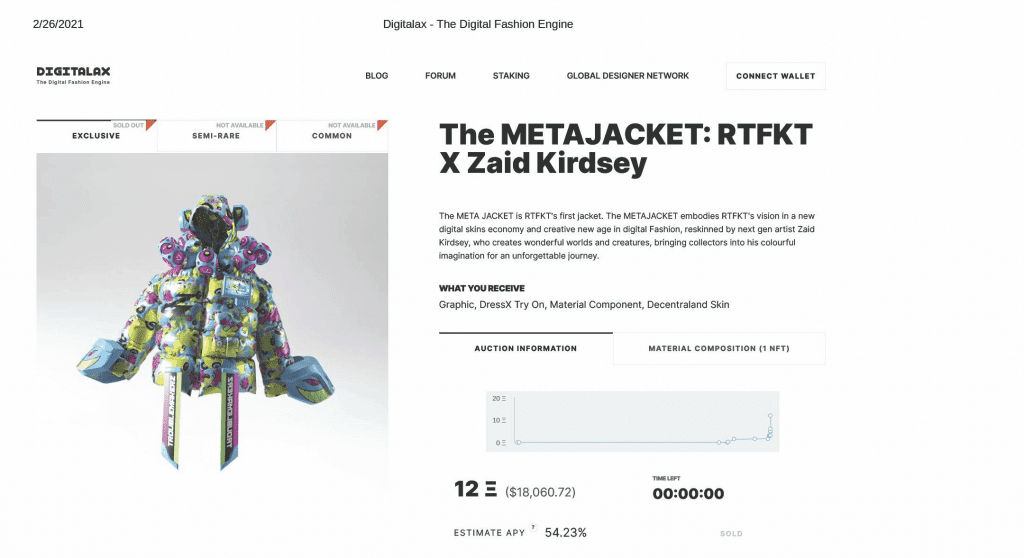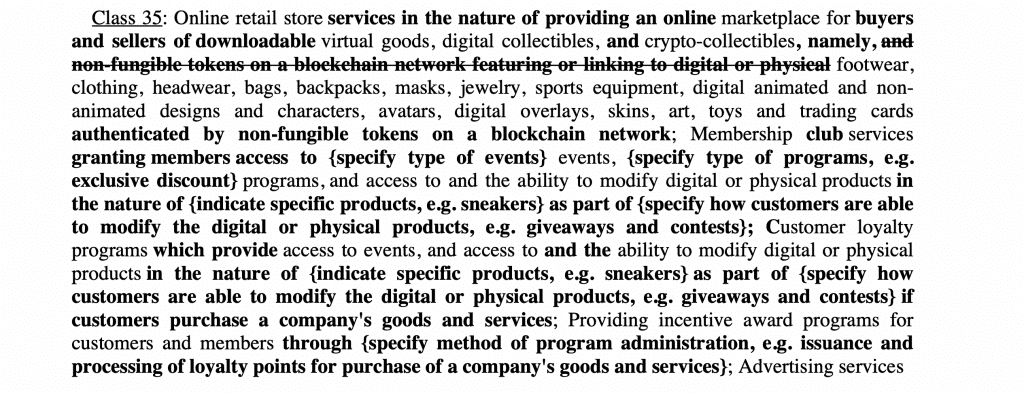Deep Dives
Over the past several months, brands have rushed to filed trademark applications for registration with the U.S. Patent and Trademark Office (“USPTO”) and other national trademark bodies, often driven by uncertainty as to how their existing rights and registrations will apply when it comes to things like non-fungible tokens (“NFTs”) and the metaverse. Some of the most widely-covered applications in this realm come by way of Nike, which filed headline-making applications for registration for use on various virtual goods/services in October 2021 in the U.S., as well as in Singapore, Switzerland, Mexico, and Canada, and has since filed additional applications for metaverse-focused marks.
With such applications still pending before the USPTO – and not yet subject to either pushback from the trademark office in the form of Office Actions or publication in the Official Gazette (the current USPTO backlog for reviewing applications is at least 7.9 months), those looking to garner guidance from them as to how the USPTO will treat applications claiming use (or intended use) on “downloadable virtual goods;” “retail store services featuring virtual goods;” and/or “entertainment services, namely, providing on-line, non-downloadable virtual footwear, clothing, headwear, eyewear, [and] bags,” among other things, “for use in virtual environments” will have to keep waiting.
There are, however, clues to be found elsewhere under the Nike, Inc. umbrella, as some early trademarks for virtual goods in the fashion/footwear space have come from RTKFT, the digitally-native brand that the Swoosh acquired late last year. With relatively few examples of how the USPTO will handle the recent flood of metaverse-centric marks, a number of RTFKT’s U.S. trademark registrations and pending applications are worthy of attention. Here are a few of the most noteworthy …
(1) RTFKT Blade Logo
Primarily, there is the application that RTFKT filed in early March 2021 for its logo – which consists of “the stylized design of a blade” – for use on “downloadable virtual goods, namely, computer programs featuring footwear for use in online virtual worlds.” Filed on a 1(a) basis, RTFKT confirmed that it was using the mark in connection with virtual goods as early as October 2020 and pointed to images of virtual footwear that bear the logo, and interestingly, physical footwear bearing the logo, as well. Without any pushback from the USPTO and in lieu of any issues at the opposition stage, the mark (Reg. No. 6621476) was registered by the USPTO in January 2022.

(2) METAJACKET
Also in March 2021, RTFKT filed an application for METAJACKET for use on “downloadable virtual goods, namely, articles of clothing, featuring jackets, coats, anoraks for use in online virtual worlds.” For the specimens showing use of the mark in commerce (the application was filed on a 1(a) basis), RTFKT provided the USPTO with screenshots from digital fashion site Digitalax that showed its digital METAJACKET skins being offered up for auction, as well as screenshots from its own site showing its use of the METAJACKET mark alongside virtual jackets. That mark was similarly registered by the USPTO in January 2022 in lieu of any Office Actions.
The USPTO does not appear to take issue with the use of the “meta” prefix in connection with virtual goods, as in addition to registering METAJACKET (Reg. No. 6621477), it granted a notice of allowance to RTKFT in January for the METAMALL mark. In the 1(b) application that it lodged with the USPTO in June 2021, RTFKT stated that it intends to use the mark in connection with “retail store services featuring virtual goods, namely, clothing and footwear for use in online virtual worlds; promoting the goods and services of others by means of operating an on-line shopping mall with links to the retail web sites of others” (Class 35) and “providing on-line art exhibitions” (Class 41).
(Given that the growing link between the prefix “meta” and the metaverse (as indicated by Facebook’s rebrand and as Hermès’ trademark suit over the MetaBirkins NFTs, in which the luxury brand claims that Mason Rothschild’s use of the “Meta” prefix “creates the explicitly misleading impression that Hermès, the only source of Birkin handbags, is offering Birkin handbags in the METAverse.”), it is interesting that the USPTO did not take issue with this mark on the basis of descriptiveness in something of the same way that it did with the CYBERSNEAKER mark below.)

(3) RTFKT Word Mark (Classes 25 & 35)
The USPTO gave the green light to the application for registration that RTFKT filed for the RTFKT word mark in March 2021 for use on physical footwear and “on-line retail store services featuring physical and virtual merchandise for use by members of an online community in connection with a designated website featuring fictional characters.” RTFKT’s specimens consisted of images of physical footwear bearing the RTFKT name and screenshots from the RTFKT website depicting offerings in its “Drop Archive.” The mark was registered by the USPTO (Reg. No. 6621478) – again, without pushback from the examiner – in November 2021.
Not all of RTFKT’s trademark applications have sailed through the registration process with the USPTO. For instance …
(4) CYBERSNEAKER
The 1(a) application for registration for CYBERSNEAKER (Ser. No. 90621088) that RTFKT filed in April 2021 for use on “footwear” (Class 25) and “downloadable virtual goods, namely, computer programs featuring footwear for use in online virtual worlds” (Class 9) has faced pushback. In an October 2021 Office Action, a USPTO examining attorney issued a partial refusal on the basis that the mark is merely descriptive for use in Class 9, asserting that “dictionary evidence defines ‘CYBER’ as of, or relating to computers or the internet, and ‘SNEAKER’ as a sports shoe.”
The examining attorney stated that the CYBERSNEAKER mark “is merely descriptive because it combines two descriptive terms to immediately convey to consumers that applicant’s goods include sports shoes on the internet.” In response, RTFKT opted to partially abandon the application, dropping Class 9, and proceeding with “footwear” (i.e., physical footwear) in Class 25 – on an intent-to-use basis – as the sole class of goods/services going forward. The application has since been published for opposition, with the USPTO issuing a Notice of Publication on May 4.
(5) METAWEAR
RTKFT has also faced pushback from the USPTO in response to its application for registration for METAWEAR (Ser. No. 90751999), which it filed in June 2021 on a 1(b) basis for use in Class 9 on “downloadable virtual goods, namely, computer programs featuring non-fungible digital asset tokens used with blockchain technology to represent a collectible item for use online or online virtual worlds.” In an October 2021 Office Action, the USPTO stated that RTFKT’s “identification of goods is indefinite and suggested that, if accurate, RTFKT adopt the following description of the goods (additional wording in bold), ‘Class 9: Downloadable virtual goods, namely, computer programs featuring non-fungible digital asset tokens used with blockchain technology to represent a collectible item for use in online virtual worlds.’”
RTFKT adopted the USPTO’s proposed language, and the application is now slated for publication.
(6) RTFKT Wordmark (Classes 9, 16, 18, 25, 28, 35, 40, 41, 42 & 45)
Finally, RTFKT filed an application for registration for RTFKT (Ser. No. 97108400) for use across classes 9, 16, 18, 25, 28, 35, 40, 41, 42, and 45 in November 2021. The USPTO has since taken issue with the aspects of the goods/services descriptions, largely on the basis that the language is “indefinite” or “unclear.” For instance, in regards to the Class 35 description, the USPTO examining attorney stated in a May 10 action that certain language – namely, “online retail store and marketplace services for virtual goods, digital collectibles, crypto- collectibles and NFTs on a blockchain network featuring or linking to digital or physical footwear, clothing, […] avatars, digital overlays, skins,” etc. – is indefinite and must be clarified because “it is not clear that the identified goods are authenticated by NFTs.”
To permit proper classification of virtual goods associated with NFTs, the examining attorney stated that “the identification for these goods and/or services must (1) identify the specific underlying digital items represented by the NFTs, and (2) indicate that such digital items are ‘authenticated by NFTs.’”
The USPTO’s proposed amendments for the Class 35 description is as follows …

At the same time, the USPTO found that the typical Class 41 wording of “entertainment services, namely, providing on-line, non-downloadable interactive media, video clips, photography, music, data, visual effects, digital collectibles and crypto-collectibles associated with non-fungible tokens on a blockchain network featuring or linking to digital or physical footwear, clothing,” etc. is also indefinite because “the nature of the service is unclear.”
More to come on these pending applications for registration and other metaverse marks as they develop.